Kabam was one of the most inspiring rags-to-riches stories of modern gaming. Founded in 2008 by former University of California at Berkeley students, it started out as social game company Watercooler Games. It changed its name to Kabam and saw early success with titles like Kingdoms of Camelot and Dragons of Atlantis on Facebook’s explosive social network.
Then it pivoted away from Facebook, moved into mobile games, expanded worldwide, and circled its wagons around fewer, bigger, and better mobile games. By the end, it had huge hits like The Hobbit: Kingdoms of Middle-earth and Marvel Contest of Champions. Kabam thinned out, reducing its staff from a peak of 800 employees, and spun out smaller and older titles. That drew suitors, and longtime CEO Kevin Chou and chief operating officer Kent Wakeford were faced with a dilemma.
They had to figure out how to maximize shareholder revenues, but in doing so, they started on a process that put them out of their jobs. They sold Kabam’s Vancouver division earlier this year to Netmarble for an estimated $800 million, and the entity was renamed Kabam Games.
And this week, they sold the remaining assets — a Los Angeles studio and a team in San Francisco (now known as Aftershock) — to FoxNext. Chou and Wakeford aren’t going to work at FoxNext, so they have exited the company. Their work generated nearly $1 billion in proceeds for Kabam and its shareholders. I talked with Chou and Wakeford in a joint interview about the history of Kabam and their fond farewell to it.
Here’s an edited transcript of our conversation.

Above: Marvel Contest of Champions was Kabam’s biggest game.
GamesBeat: How did this unfold? Why did selling the company in two parts turn out to be a good idea?
Kent Wakeford: About 12 months ago, we had two inbound offers for the whole company. One was from a traditional console company that you’d know well, and the other was from a big Chinese game company. Kevin brought those to the board of directors and the board said these were bonafide offers and we should explore them. That led to engaging a bank and doing a lot of analysis around valuation and thinking about how you value companies. At Kabam’s size and scale at the time – around $400 million in revenue and around 800 employees – you look at that as a large game company. You use much more traditional valuation methods, similar to how you would think about public game companies.
Kevin had this amazing insight. If you look at our Vancouver studio, which had developed and was running Marvel Contest of Champions, that studio was generating significant profit, or EBITDA, however you want to characterize it. Players were engaged in that game and sticking around for years. It was a very healthy studio, with a great deal of operating profit, great leadership, and a new game in the pipeline with Transformers. If you look at that aspect of the business and apply traditional multiples to it, that part of the business was worth a lot of money.
If you look at the other areas of the business, which were more in an R&D phase with games in development that would be launched at some future date, those were also exciting areas, but they were more cost centers. Going back to Kevin, he had this concept of, what if we look at this as two separate companies and consider the valuations of each? Through that insight, some of the parts were worth more than the whole. Kevin instructed everyone to go down the path of looking at the sale in two pieces. When we looked at it, both on paper and then going out to market, his instincts were correct. We ended up getting 12 bids for the Vancouver studio that were very significant, and ended up selling for $800 million.
It was a great outcome and a tribute to Kevin’s instincts and intuition on what was a unique path, but which ultimately turned out to be incredibly beneficial to shareholders and employees.
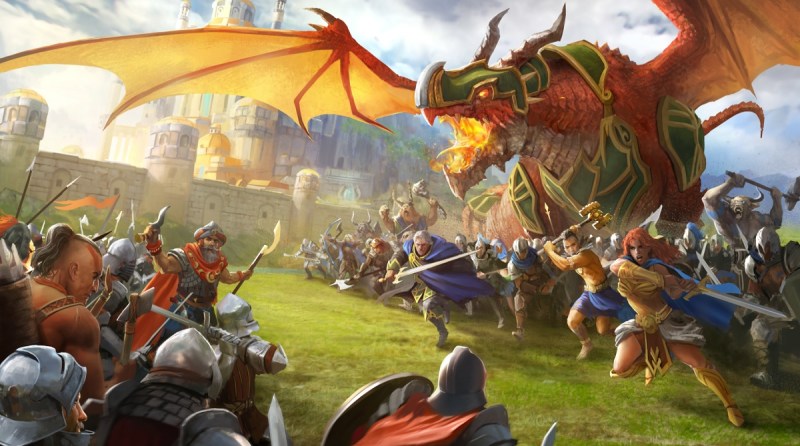
Above: Dragons of Atlantis generated more than $100 million for Kabam.
GamesBeat: It looked like some of this started even earlier, with all of your smaller divestitures.
Wakeford: Starting about two years ago, Kevin led a strategy within the company to focus on a much smaller group of high quality games, putting the best people, more resources, and higher production values into development. We eliminated older, legacy games that were using 15 different technologies and putting a strain on the business, especially a strain on the ability to grow, because we had so many people supporting legacy business.
As part of this strategic shift – fewer, bigger, bolder – we went down a path of divesting, spinning out a number of older products. That included a series of sales and licenses with RockYou for a lot of legacy Facebook games, and two transactions with Gaia – one around legacy mobile games and one around our publishing business. We spun out Realm of the Mad God to an ex-employee, who started a company called Deca. We spun out the Phoenix Age team into a new studio called Phoenix One, which just launched its first game, Guardian Kingdoms. That was featured in the App Store. That string of divestitures, if you add up all the revenues that have been paid plus potential revenues in the future, it was a substantial amount of money, somewhere between $70 and $80 million. There are still revenues from those divestitures coming in to Aftershock.
GamesBeat: Kevin, what’s your perspective on this process of exiting Kabam?
Kevin Chou: It’s been a pretty interesting couple of years, as we shifted our strategy as a company. At the time when we came up with our focus on triple-A, we didn’t anticipate all of these things coming out of it, but my perspective was, number one, focusing the company on a very specific strategy was the way the market was going. It would be the best thing for giving ourselves a chance to be differentiated in the marketplace.
Number two, I’ve been running the company for 10 years. We’ve made strategic shifts in the past. One thing that’s always been very difficult was, you have parts of the company that aren’t working on projects that are important to the future of the company. Trying to continue managing through and carrying these older game franchises, which are still pretty profitable—if you’re working on one of these projects it’s not where the big bets of the future are going to be. Instead of trying to manage both the past and future of the company, we divested some of those assets. As we were divesting these games that have been the backbone of the company, it started the inbound interest from others. “Hey, you’re selling some legacy publishing and mobile games. Would you be interested in selling Marvel Contest of Champions?” That snowballed into what became the final exit of the entire company. All told, it’ll be just under $1 billion.
I’m happy that we were able to find good homes for everyone. The people who worked on the Facebook business, the web game business, they get to be part of a company that just wants to focus on those things. For some of the newer parts of the company, they get to go on an exciting new mission with Aftershock. They’re going to be the entire Fox digital gaming strategy and business unit. That’s an exciting job for those people. For the Kabam plus Netmarble team, they get to team up with a company that’s focused on mid-core games. Marvel Contest of Champions benefits from that type of scale, audience, marketing, and distribution power around the world.
It’s a good ending to the overall story that’s unfolded over 10 years. I’m happy. It’s a relief, in a way, that this all ended well. It’s a very complex thing to do. We asked a lot of people to rethink. It’s not common to sell a company this way, but it ended up being the most beneficial path for multiple groups within the company. They can go off and join other companies that are focused on the same things.

Above: Star Wars: Uprising was a hit for Kabam, but it ended earlier than expected.
GamesBeat: Is it strange, in a way, that you did this so well that you pushed yourself out of a job?
Chou: Some people who worked for me might be happy about that. [Laughs] It’s bittersweet in that we assembled a great team of people. Through the ups and downs, we weathered it all together and finished the journey in a unique way. I think everyone will be proud of this part of their careers. I know I will. But it’s the final chapter. The story is over at this point. People are going their separate ways. That part of it is sad, for sure.
GamesBeat: What’s your own plan now? Do you want to go do something new?
Chou: I’ve been lucky in that we’ve worked through some of the Aftershock things. It doesn’t quite make sense for me to be leading the sale process there, because I wouldn’t be going with the acquirer. Aaron Loeb, who’s been the president of our studios, is going to Fox and becoming the head of studios, which is an awesome job, a huge opportunity for him. He and Kent have teamed up with our CFO to finalize the transaction. So I’ve had a good break for the last four months or so since we closed the Netmarble deal.
I’m starting to work on a couple of things. One area that I’m excited about right now is esports. I’m working on some opportunities there. Health care is another area I find exciting right now. We’ll see what happens. I haven’t figured it all out yet. I’m taking my time and not rushing into anything. I’m excited about starting a new journey.
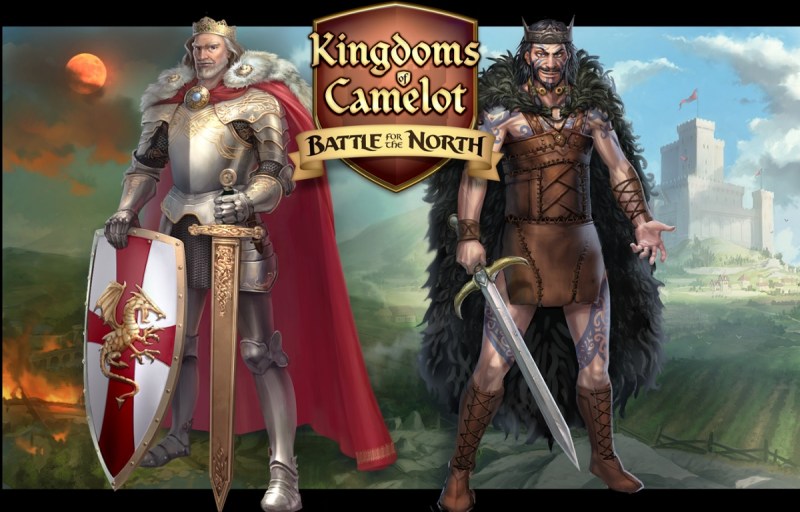
Above: Kingdoms of Camelot: Battle for the North was one of Kabam’s early mobile successes.
GamesBeat: Are you thinking about investing or actually starting something?
Chou: I’m looking at both. I definitely want to play a more active role. You won’t just see me join a venture fund. There are a few things in esports that I might be involved in as a board member, bringing capital together, bringing expertise together, and taking an active role as a chairman or something like that. I’m also very excited about taking an operating role, starting a new adventure as an entrepreneur.
GamesBeat: Was there a point where you ever thought that Kabam should not be on its own? Was it as you received the offers, or was it earlier than that?
Chou: It was definitely earlier. When I was looking around the industry and thinking ahead a few years, coming up with the fewer-bigger-bolder strategy, it was because I felt like at that time, consolidation was starting to happen. It wasn’t at the frenzy it is now, but I realized that the market was becoming more mature. The games at the top of the charts were stuck in place for a lot longer. The opportunities to join forces with another company and pool resources and talent were going to make a lot more sense.
When we got approached by those two companies Kent talked about, it made sense. We expected this to happen in the industry. That fact that a couple of really big, exciting companies that understood the gaming business well and had developed different parts of their business—that we could join forces with the Chinese company to serve as a geographic anchor in the U.S. market, or join with the console company to become their mobile division and complement some of the things they were doing, that just made a ton of sense. It fit with the overall view of the marketplace that was happening. It made sense to join forces at that time.
GamesBeat: Kent, as you’re also not going with the final entity, did you have any similar thinking to Kevin’s as far as where you were going to wind up?
Wakeford: As Kevin mentioned, he’s been able to unwind for the last couple of months while he’s put me and Steve and Aaron to work. [Laughs] I’m not quite as far as long as he is when it comes to thinking about that. But I’m ready to go seek out new adventures. You’ll likely see me doing something with Kevin.
GamesBeat: What is some of the advice you think you’ve picked up for entrepreneurs and others who are following in your footsteps in the game business?
Chou: Right now, the most important part of being an entrepreneur is understanding where opportunities exist for entrepreneurs, as opposed to established companies. It’s always important to not just think about an overall industry or market, like games, but to consider what parts of the market have more opportunities for entrepreneurs as opposed to established players. When Facebook became an interesting platform for gaming, it was very clear that entrepreneurs had a huge advantage. We weren’t encumbered by existing retail business, or the way our game designers thought about creating 40 hours of content on a disc. It called for a fresh way of thinking about building and monetizing games. It was fertile ground for entrepreneurs seven or eight years ago.
Today, in the mobile gaming space, my perspective is that it’s not that kind of ground at all. Even though mobile continues to grow in parts of the world and it’s a huge marketplace—my advice to entrepreneurs starting out right now is that creating content for mobile games is a market where the incumbents have a big advantage. Areas like esports are still very healthy. That’s an exciting new industry that makes a lot of people scratch their heads. Whenever that happens, just like when Facebook gaming first became a thing, that’s an area rife with opportunity.
A lot of entrepreneurs are betting on AR and VR. I still think that’s exciting, but until the hardware numbers become a lot more interesting for content developers, it’s hard to play there. As an entrepreneur, my advice is to seek out different opportunities in the broader gaming ecosystem, however you want to define that. Find areas where a smaller company can have an advantage.
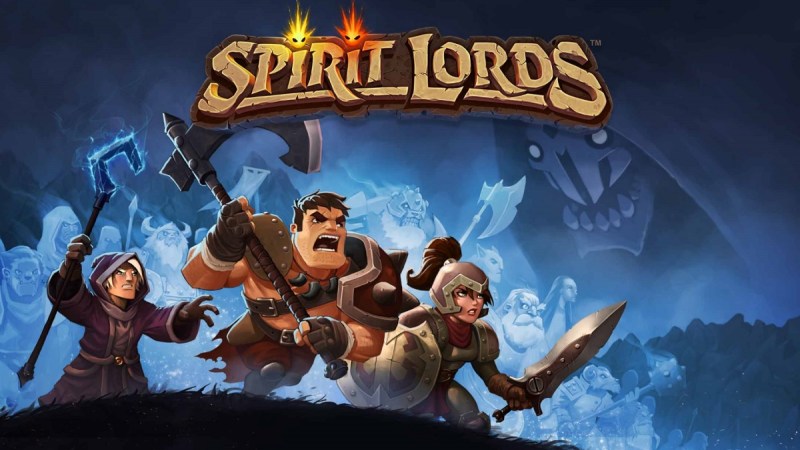
Above: Spirit Lords was a hit, but a temporary one.
GamesBeat: It seemed like along the way, you guys had a lot of challenges dealing with changes in the platforms. I remember the Facebook platform change, where their virality basically went away and you decided to diversify. How, as an exec at a game company, do you deal with so much change happening on the platform level? Is there advice you’d have for people on that level, at bigger companies? Apple announced all its support for augmented reality, for example.
Chou: It happened to us quite often. It happened to any gaming company that got started in the last decade, and it’ll continue to happen. We’re in a world where technology cycles are collapsing and going faster and faster. There’s a good chart going back to mainframe,s showing how long each major computing platform has lasted. PCs lasted a shorter time than mainframes. Then the internet, with Facebook as a sub-platform. Mobile came along with iOS and Android. Today it’s fragmenting again into AR and VR, messaging, and others. Managing through platform changes will be a key part of a gaming exec’s job for the foreseeable future.
There’s an art and science to it. The science is deeply understanding the technology and business model behind the platform, figuring out if it’s worth betting on. The art is deciding on the appropriate amount of resources to devote. How do you set up an organization inside your broader organization to invest in a platform? Do you combine with your existing studios? Do you buy a company that’s already specialized in that area? Once you figure out that it’s worth tackling, there’s an art to finding the right way to execute against a platform shift.
Nothing beats experience. Once you’ve weathered platform changes, whether you’re a console gaming company migrating from the last generation to the current one—every console company is switching their business model from pure premium sales to a blend of premium sales and ongoing services and microtransactions within games. Many companies are dealing with these changes. To me, the job description of an executive is to deal with the inevitable platform changes and business model changes that will happen all through the foreseeable future.
GamesBeat: Do you have any regrets from along the way, or momentous decisions you look back on in a different way?
Chou: When we decided to focus our business on getting out of Facebook, that was a big decision. A lot of people in the company were not excited about it. It wasn’t clear how it was going to turn out. As it happened it turned out quite well. We actually had a company-wide goal that we called Independence Day, on July 4 of the next year. We wanted more than half our business to be off of facebook. I remember when I set that goal in front of the whole company, talking about it at an all-hands meeting, there were audible gasps from people. We hit that goal. I was proud of the whole company for marshalling around that.
Wakeford: We were known in the industry to move quickly and take bold steps, whether that was migrating off of Facebook and moving into mobile, or moving into a strategy of fewer, bigger games. Part of our DNA was innovation and the ability to see opportunities and shift the entire company. But you asked about regrets. As fast as we moved, there were times we didn’t move fast enough. Moving on from projects or other games that we saw wouldn’t hit the level of success we anticipated—we held on too long sometimes, for any number of reasons. In a fast-moving environment, being able to make decisions and move quickly is key to success.
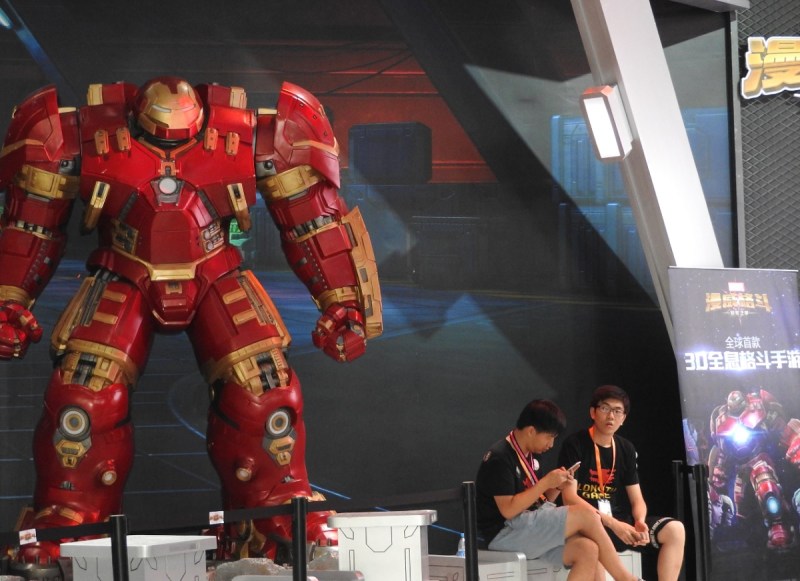
Above: Marvel Contest of Champions Iron Man character at ChinaJoy.
GamesBeat: How do you look at something like China? You did some things there that no American mobile game company had done, but it wasn’t as big a success as you might have hoped.
Chou: If I had to do it all over again, with perfect 20/20 hindsight, I wouldn’t make that decision. But there were things that we did—there were good, innovative bets and risks that we took that ultimately didn’t work out. I would have done it differently if I knew what the outcome was going to be. But at the time, making a big play into China, a big investment, I don’t regret that. When I look at the overall market, I still believe that at some point, western companies will be successful in China. It’s a matter of time, time for the market to adapt and evolve.
China, as I look back–that and our third-party publishing business were two high-profile things we did that ultimately did not work, but I don’t regret those decisions. They were good business decisions. I’m proud of the way we tried to execute on them. In both areas, we probably did more than most western companies did as far as making progress and figuring things out and having a very solid shot at building a business. It’s not a sense of, “What was I thinking? That was just inexperience.” I don’t feel that type of regret. I’m proud that we were willing to take some risks and be innovative in how we ran the business.
GamesBeat: Do you think the West can compete in Asia, with all the very large companies in the games market there?
Chou: I think so. I point to Blizzard, which has been very successful in Korea. Supercell has made huge advantages elsewhere, with the way they’ve partnered with Tencent. Their success in Asia was partially what drove Tencent to do such a massive acquisition of that company. To a lesser extent, other companies have had reasonable success in that market, even though they haven’t become big players. More and more companies are figuring it out.
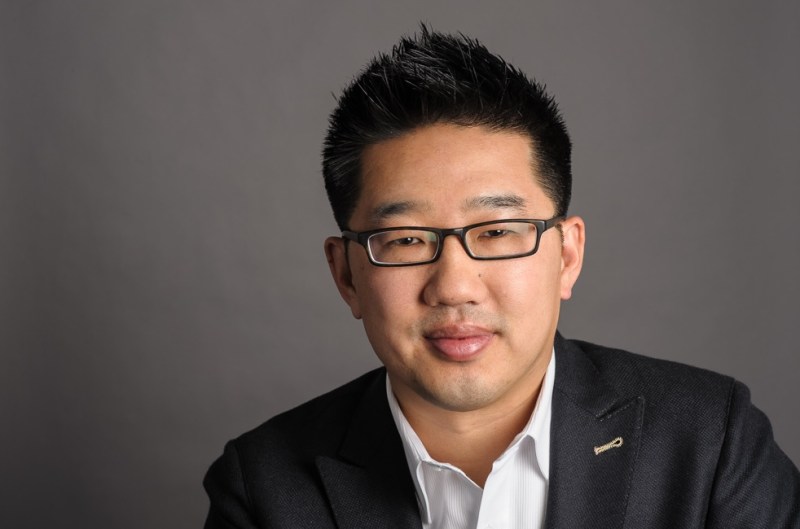
Above: Kabam cofounder Kevin Chou.
GamesBeat: It must have been hard figuring out what was part of Vancouver and what was part of Aftershock.
Wakeford: There were a couple of natural ways, as we looked at the company, to think through it. With Vancouver, there’s obviously a geographical break. Our studio in Vancouver had development taking place there. Fast and Furious, Marvel Contest of Champions, Transformers, all those games had been developed in Vancouver itself. The live games used our customer service operation in Austin, Texas. Those two were a natural entity to contain in one group.
The other part of the natural split was that the leadership team up in Vancouver was just terrific. Tim Fields is now the CEO of Kabam Games. Jeff Howell is now the CTO of Kabam Games. They’re great leaders, more than capable of running huge studios, or in this case a huge division within a public company. There was a natural break from a geographic perspective, a team perspective, and a leadership perspective. And they were generating revenue. They had a fully formed P&L that they were managing within our company.
The Los Angeles studio and the San Francisco studio both had games in development. Equally, with those studios, you had amazing leadership. Aaron Loeb was in San Francisco, and in Los Angeles you had Amir Rahimi, the GM there. Very capable leaders in both areas. Again, you could break it up from both a geographic perspective and a leadership perspective. It made for a relatively clean split from the company in that way.
Vancouver, again, was fully funded, with future R&D they were working on. It was very clean to have them as a single entity and spin out the rest of the assets into Aftershock.
GamesBeat: Did the Beijing studio turn out to be too complicated to keep together?
Wakeford: If you think about the Vancouver studio, that was a natural sale. The financials on that entity were fantastic. There were natural buyers for it. Similarly, with Los Angeles and San Francisco, there was a natural fit for those studios to become part of a larger entity, in this case Fox. Unfortunately, with Beijing, there wasn’t a clear fit or home for them within another entity. Having sold off a number of their legacy games, including games like The Hobbit, we ended up closing the rest of the studio.

Above: Kabam COO Kent Wakeford.

